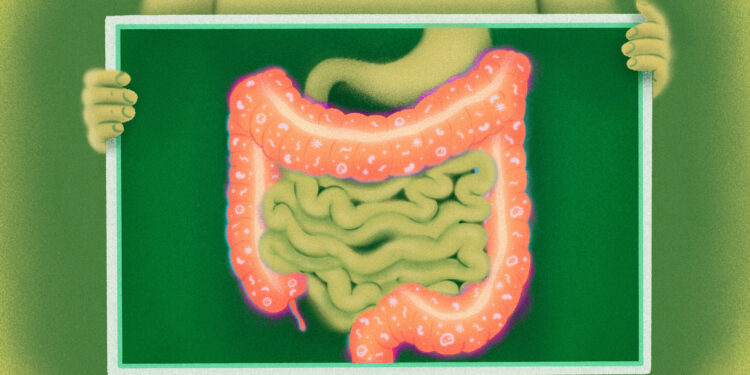Studies in mice reveal the mechanism that induces this serious side effect and suggest a solution that kills cancer without causing gastrointestinal problems. Credit: Michigan Medicine
Researchers at the University of Michigan Rogel Cancer Center have identified a mechanism that causes serious gastrointestinal problems through immune-based treatment of cancer.
They also found a way to harness the anti-cancer impact of immunotherapy without unwanted side effects.
The results are published in Science.
“This is a good example of how understanding a mechanism helps you develop a more beneficial alternative therapy. Once we identify the mechanism that causes colitis, we could then develop ways to overcome this problem and prevent colitis while preserving the antitumor effect,” said the study’s senior author, Gabriel Nunez, MD, Paul de Kruif Professor of Pathology at Michigan Medicine.
Immunotherapy has emerged as a promising treatment for several types of cancer. But immune checkpoint inhibitors can also cause serious side effects, including colitis, which is inflammation of the digestive tract.
Colitis can cause serious gastrointestinal upset and some patients will discontinue their cancer treatment because of it.
The problem the researchers faced was that although the patients developed colitis, the laboratory mice did not. The researchers were therefore unable to study the cause of this side effect.
To overcome this problem, the Rogel team, led by first author Bernard C. Lo, Ph.D., created a new mouse model, injecting the microbiota from wild mice into the traditional mouse model.
In this model, mice developed colitis after administration of antibodies used for tumor immunotherapy. Now researchers could trace the mechanism to see what was causing this reaction.
In fact, colitis developed due to the composition of the gut microbiota, which caused hyperactivation of immune T cells, while regulatory T cells that dampened T cell activation were suppressed in the intestine.
This occurred in a specific area of immune checkpoint antibodies.
The researchers then removed this domain, which they found still resulted in a strong anti-tumor response but without inducing colitis.
“Previously, some data suggested the presence of certain bacteria correlated with treatment response. But it has not been proven that the microbiota is essential for the development of colitis. This work shows for the first time that the microbiota is essential to the development of colitis from immune checkpoint inhibition,” Nunez said.
To follow up on what they observed in mice, the researchers reanalyzed previously reported data from studies of human cells from patients treated with immune checkpoint antibodies, which supported the role of T cells regulatory functions in the induction of colitis.
The antibody they used to stop colitis was developed by Takeda Pharmaceuticals.
The Rogel team is planning additional studies to better understand the mechanisms causing colitis and is seeking clinical partners to transfer this knowledge to a clinical trial.
Other authors include Ilona Kryczek, Jiali Yu, Linda Vatan, Roberta Caruso, Masanori Matsumoto, Yosuke Sato, Michael H. Shaw, Naohiro Inohara, Yuying Xie, Yu Leo Lei, and Weiping Zou.
More information:
Bernard C. Lo et al, Microbiota-dependent activation of CD4+ T cells induces colitis associated with CTLA-4 blockade via Fcγ receptors, Science (2024). DOI: 10.1126/science.adh8342
Provided by University of Michigan
Quote: Researchers identify why cancer immunotherapy can cause colitis (January 7, 2024) retrieved January 7, 2024 from
This document is subject to copyright. Apart from fair use for private study or research purposes, no part may be reproduced without written permission. The content is provided for information only.



